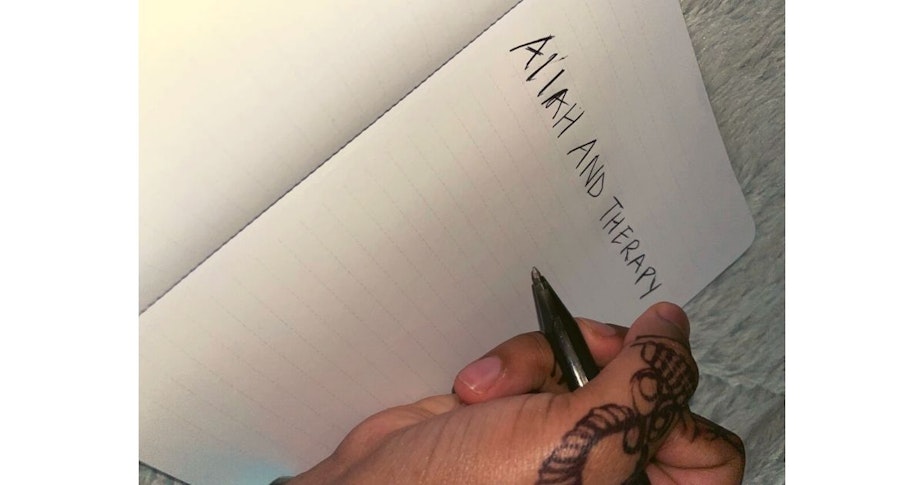'You can go to the Imam and the therapist.' Mental health in my Somali community

Talking about mental health in the Somali community is hard. There's a stigma in the community, especially around seeking professional help. But mental health is something that many in the Somali community struggle with.
RadioActive youth producer Kouther Ahmed shares a story from her community about why it's important to talk about your mental health.
Please note: This story explores trauma and mental health. It includes mentions of violence.
[RadioActive Youth Media is KUOW's radio journalism and audio storytelling program for young people. This episode was entirely youth-produced, from the writing to the audio editing.]
There are many reasons why Somali people struggle with mental health. There's the social isolation due to immigration; there's trauma from escaping a civil war. But the impact of these traumas on our community's mental health is still a conversation that needs to be had.
It’s been hard for my mom to talk about how she deals with her mental health. I talk with my hooyo, my mom, about her story.
My hooyo says she experienced so many things during the Al-Shabab times. Al-Shabab is a Jihadi militant organization based in Somalia. They control large parts of central and southern Somalia, and have ties to other Islamist terror groups like Al-Qaeda and Boko Haram.
My mother remembers her brothers, who were dragged out of their home by members of Al-Shabab and killed in front of her. My hooyo has never spoken much about her life in Somalia because she doesn’t want to go back to that dark place in her life.
My mother remembers waking up everyday feeling like she hated life. She was 12 years old at the time. She felt like she couldn’t tell anyone how she was feeling, and she felt alone.
When she did share her feelings, she hated the responses she got from her family. She says her mother would say something was wrong with her and that she needed Quran Saar, meaning she needed Quran read on her.
My hooyo was told that the reason why she had these feelings was because jinns, or demons, were controlling her.
In the Somali community, we tend to shut down conversations about our mental health and ignore it. Many people believe that if you’re struggling with your mental health, you should turn to Allah. And if you do seek help in addition to Quran Saar, it’s considered shameful — or that you are lacking faith.
In the Quran, we are encouraged to seek help from Allah. In Surah Ar Ra’d, specifically Verse 28, it mentions those who believe and find comfort in Allah’s remembrance. Surely, they will find consolation in Allah’s remembrance.
For my hooyo, listening to the Quran has brought her some peace. Telling her story to her children is another way she has coped with her trauma. I wanted to know how else I could help my mom, so I talked to Saida Abdi, a Somali person who works with people in our community who are struggling with their mental health.
When asked why it can be so hard to talk about mental health in our community, Abdi said, “Somalis actually do talk about their mental health. They just don’t talk to clinicians. They talk to their aunties, and they talk to their grandfathers, and they talk to their religious leaders, the Imams.”
When my hooyo shared her mental health struggles, no one thought to look for help from someone like Saida Abdi. Instead, my mom was told she had jinns inside of her. Abdi says this is common. “So often we will say that person 'wu walanyahay,' which essentially means ‘crazy.’ Without differentiating what the symptoms are,” Abdi said.
In the Somali community, one of the things we use to cure jinns is Quran Saar. But we need more support from our Imams. “One of the things we should do is train the Imams and religious leaders more about what to do about mental health,” Abdi said.
In Islam, there are many ways you can seek help for your mental health. Abdi agrees, saying, “Our religion says, seek help from everyone, every possible way. So maybe you can go to the Imam and go to the therapist, both, instead of creating more adversity and more struggle over arguing about which one to go to.”
Because the civil war is long-standing in Somalia, nearly every Somalis has been impacted by trauma, like my hooyo. When you have been through a traumatic experience, it can be helpful to speak about it and share your experience with someone. I want to make sure that people in my community who suffer from mental health issues can speak up and get whatever help they need.
After our conversation, my mom says she is more open to talking to a professional in the future.
I want to help this conversation around mental health continue in my community, and let others know that we have a community of professionals behind us who can support us. After talking to my mom, it gave me reassurance to seek help if I start to struggle with my own mental health.
This RadioActive Youth Media podcast was produced in an advanced producers program for high school and college students. Production assistance by Sonya Harris. Prepared for the web by Mary Heisey. Edited by Lila Lakehart with story consulting by Mohamud Yussuf.
Find RadioActive on Facebook, Twitter, Instagram, TikTok, and on the RadioActive podcast.
Support for KUOW's RadioActive comes from the Bill & Melinda Gates Foundation Discovery Center.
If you have any feedback on this story, you can email RadioActive at radioactive@kuow.org or find RadioActive on Twitter @kuowradioactive. Or you can just click the feedback button on the right hand side of this page. Reach out. We're listening.



